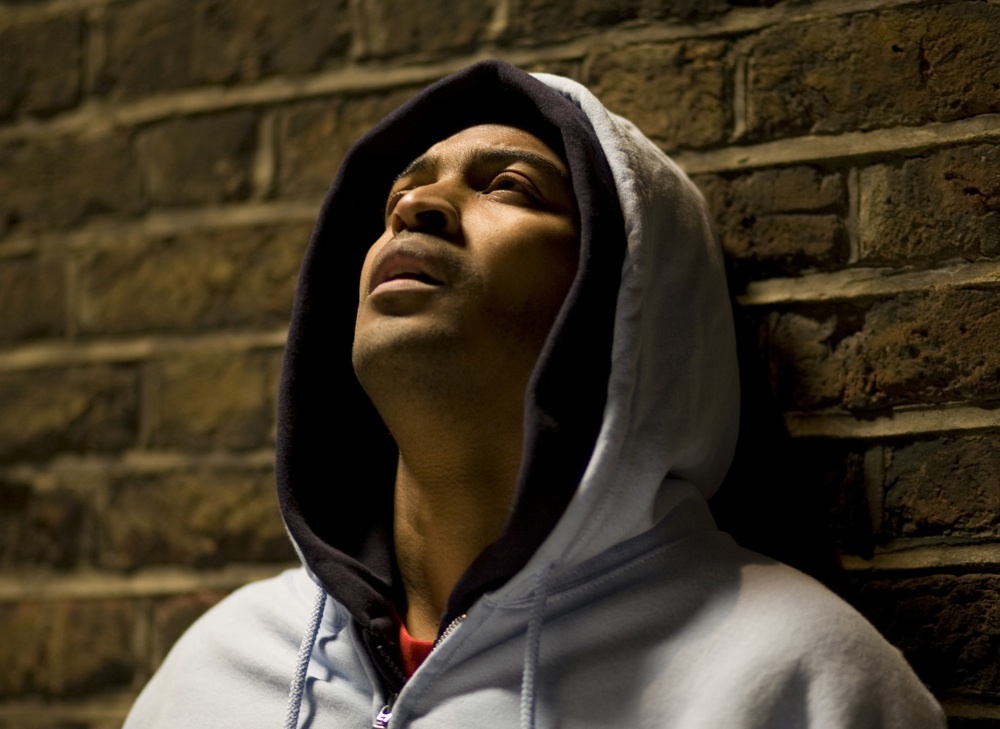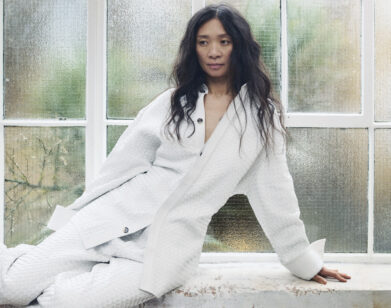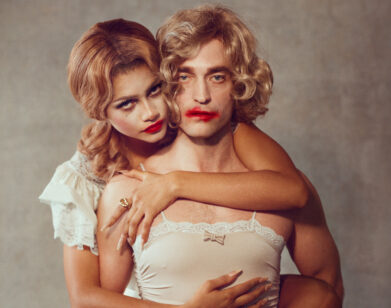Noel Clarke’s Undiscovered Country

ABOVE: NOEL CLARKE IN ADULTHOOD.
Last night, J.J. Abrams added British writer-director-actor Noel Clarke to the cast of Star Trek 2. Clarke gained acclaim when he wrote and appeared the gritty and shocking Kidulthood in 2006. Set in West London council estates, the less glamorous side of the famous Notting Hill area, Kidulthood reminds us just how brutal teenagers can be towards one another. School is a battle zone, a merciless hierarchy. What is most shocking about the film, however, is the story of redemption that permeates its sequel, 2008’s Adulthood. The troubled teenagers we meet in Kidulthood are not forever doomed to delinquency; in Clarke’s world, people can change, assume responsibility for their mistakes.
Clarke’s role in Star Trek 2 will undoubtedly provide a huge boost to his career; while Clarke was named the British Academy of Film and Television’s “rising star” in 2009, he is probably best known in the US for his smaller roles in films like Centurion, or his guest role on BBC America’s Doctor Who. But before the world gets carried away in the Star Trek publicity campaign, we wanted you to know a little more about Clarke the director. We spoke with Clarke at Soho House in London a few weeks ago about the evolution of British film, how Pulp Fiction inspired him to direct, and what else he’s up to next.
EMMA BROWN: How are you?
NOEL CLARKE: I’m good, thanks. Just finished wrapping [my film] Fast Girls last night, wrap party today.
BROWN: Do you have a bit of free time before your next project?
CLARKE: Yeah, I don’t think I’m directing anything until July, but I’ll be starting on an [acting] job in February. I’m not allowed to say [what the job is], it’s that exciting.
BROWN: You’ve written quite a few films now—Adult and Kidulthood, 4.3.2.1 and the upcoming Storage 24 and Fast Girls—but you don’t always direct them. How do you decide which of your films you are going to direct and which of your films you just want to act in?
CLARKE: I just see how I feel about them after they’re written. When I write a project, it might be something that I want to do and then when I look at it, I’m actually like, “I kind of don’t want to direct it.” I don’t know why, I still love it enough for it to be made and to support it, but I don’t want to direct it. I just give it to other directors and they do a good job!
BROWN: Are you very particular about who you let direct your work?
CLARKE: No, I don’t want to be seen as being biased or anything like that, so I let another producer choose someone and we’ll look at the tapes of their work, or if they’re a first-timer, we’ll look at their music videos or their short films.
BROWN: The first film that you directed was Adulthood, the sequel to your breakout film Kidulthood. I’m surprised they trusted you with that when you’d never directed anything before…
CLARKE: The Film Council and Pathé made me do a test shoot; you kind of had to do a short film to see if you were up to scratch. That was four months before the film, and that’s [also] sort of a test about whether you get the financing. When I passed the test, they said, “Right, you can direct the feature.” I got to do one short before, but other than that, [it was my] first time. It was tough, a learning experience, but I’d been on a lot of sets before that with stuff I’d written and just as an actor. Then it’s just about paying attention, learning the other things and having a good DOP [director of photography] around you. I don’t really get that stressed, what will be will be.
BROWN: When you wrote Kidulthood, did you know that there was going to be an Adulthood?
CLARKE: No. When I wrote Kidulthood, I didn’t even know there was going to be a Kidulthood. I just wanted to test myself to see if I could write a script. I’d written a few before, but I’d never written any on my own, so I just started writing what I knew from my area and how I grew up a little bit. People liked it and it went from there.
BROWN: Did you know you were going to play Sam? He’s not a very appealing character in Kidulthood…
CLARKE: No, no. When I originally wrote it, I wanted to play the main part [Trife], when [Menhaj] Huda came on, the director, he was like, “There’s no way you’re playing the main part, you look too old.” I was really upset by that, but eventually I thought, “You can get the film made and you can get it made well,” so I stepped aside. Then I said that I wanted to play [the antagonist] Sam and Huda was like, “No, no. You’re not playing Sam. You’re too small, not muscular enough. He needs to be a big bully.” I said, “Bullying isn’t about size, it’s about intimidation.” And he said, “Well, just read it in the auditions, and if you can scare other people, I’ll think about it.” I guess I was intimidating.
BROWN: So you had no idea that Sam would have the trajectory of redemption that he does in Adulthood?
CLARKE: No! Like I said, there were no plans for a second one, but when the film came out and did pretty well, then I started thinking about writing another one. I wanted to test myself again and see if I could make an audience like someone they hated before, to see if I could take two characters [from Kidulthood], Becky and Sam, and make people like them. The actress who played Becky [Jaime Winstone] dropped out, so I made it her cousin and changed the name and all that, but that was the idea.
BROWN: You were quite successful. I watched the films in succession when I was thinking about interviewing you and I wasn’t sure I wanted to meet you after just watching Kidulthood, Sam was so awful!
CLARKE: [laughs]
BROWN: Then Adulthood just completely changed my mind.
CLARKE: Because you really dislike [Sam] and then when he gets out the window in the second one you’re like “Oooh! [cheering him on]… Hang on, I’m supposed to hate him.”
BROWN: Have you always lived in West London?
CLARKE: Yeah. I grew up exactly where the films were set, Ladbroke Grove.
BROWN: How do you feel about the way it’s portrayed in other films such as Notting Hill?
CLARKE: Yeah, ‘cause it’s exactly the same area! I don’t have a problem with the way it’s portrayed, because that’s what Richard Curtis saw, the circle of people he moved in. I have a problem in that in their film, you don’t see the other side of it. I guess you can’t in a big commercial movie, but I remember watching Notting Hill and saying to my date, “When the camera moves over there you’ll see the council estate where I grew up,” and then it would just stop and it wouldn’t show it and I’d be like, “Why?” What I tried to do with Kidulthood is show elements of both, like when [the kids] go see Hamish the posh guy and it’s all in the same area. I wouldn’t say it’s balanced, but it’s more balanced than their film. But I don’t have a problem with it; their film was their experience and my film was my experience.
BROWN: I ask because Adult and Kidult feel like very British films, but when you think of very British films often what first comes to mind are films about well-to-do society; Richard Curtis films, period dramas. Do you feel like that’s starting to shift?
CLARKE: I think it’s starting to shift in the respect that we’re now having a generation of people with a voice, much like America did 17 years ago sort of with Boyz n the Hood and stuff, where there’s a bunch of people that were finding their feet in coming in and then all of a sudden they had a voice and they were like, “Well, this is our experience.” And I think that [Britain] is that far behind; Kidulthood and Adulthood were kind of the Boyz n the Hood of the UK. I think now you see a lot more British films from the perspective of, I guess what would be considered “new” British people—people of color, Asian people. I think that’s what’s happening now, whereas 20 years ago it couldn’t happen because it was still predominantly, “British film is about middle-class white families and what they do.”
BROWN: And it’s shifting in conjunction with music as well.
CLARK: Yeah, the same as when the rap kicked off [in America], like 1990, 1993, when it really kicked off with Snoop and Dre, Yo! MTV Raps … all that kind of stuff. We’re kind of getting that here today, UK stars becoming international stars, our rappers selling highly in the charts.
BROWN: Can you tell me a little bit about the film that you just finished shooting, Fast Girls?
CLARKE: Damien Jones, who was one of the producers on Kidulthood, in 2004, he said to me, “I want to do this film called Fast Girls, it’s about a female runner on a relay team.” I was like, “Dude, no one’s going to watch that movie.” So he said “Oh, okay,” and went away. Then we did Adulthood two years later, [ it came up again and I said], “Are you still talking about this film? We shouldn’t do this film, no one’s is going to want to see this movie.” Then we went off and after I did 4.3.2.1, he said, “Did you hear the news about the [2012 London] Olympics?” and I was like, “Of course, everybody knows about the Olympics… I think now we should do Fast Girls. We can have it come out just before the Olympics, a nice feel-good movie that people can go and watch and then have some hope that we’ll win some medals.” So I wrote it for him, and the movie’s shot now and looking really good.
BROWN: How do you balance acting, directing and writing? Do you prioritize one over the others?
CLARKE: I wouldn’t say that I’m a jack-of-all-trades, master of none, but I wouldn’t say that I’m brilliant at any. I’m always writing, [but] directing takes priority over everything, unless the acting is a job that lifts that whole brand. If I get a part in a big film with a big director and I was going to direct one of my one films, I would take [the former] job because that job will only help anything that I then intend to do. I think in the long run, [directing] is the thing that will outlive everything else. Maybe that and writing.
BROWN: Did you always know that you wanted to go into film?
CLARKE: Yeah. Not so much the writing-directing side, I always knew that I wanted to act. The directing thing came around 1992, when I saw movies like Clerks, Do the Right Thing, Menace to Society. Pulp Fiction blew my mind, beforehand I’d watch films and there was a beginning, middle and an end, and that’s it. There is in that film, too, but it’s out of sequence. I asked my media teacher, “You can make films out of sequence?” and he was like “Yeah! You can do whatever you want.” I just started to write because I was fed up of not seeing the stories that I wanted, so I was like “Stop moaning and write something.”
STAR TREK 2 STARTS FILMING IN FEBRUARY. ADULTHOOD AND KIDULTHOOD ARE AVAILABLE TO WATCH ON iTUNES.






